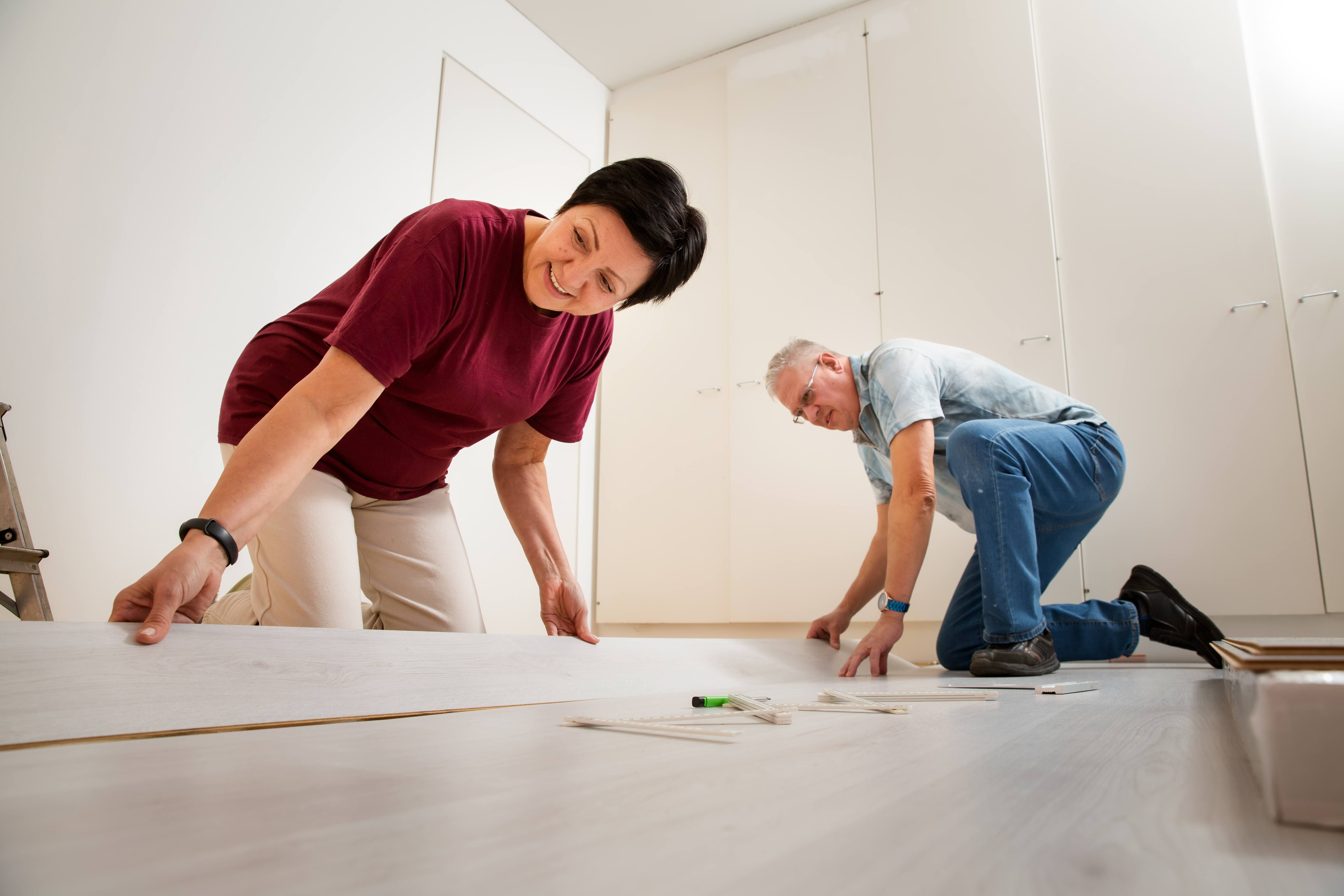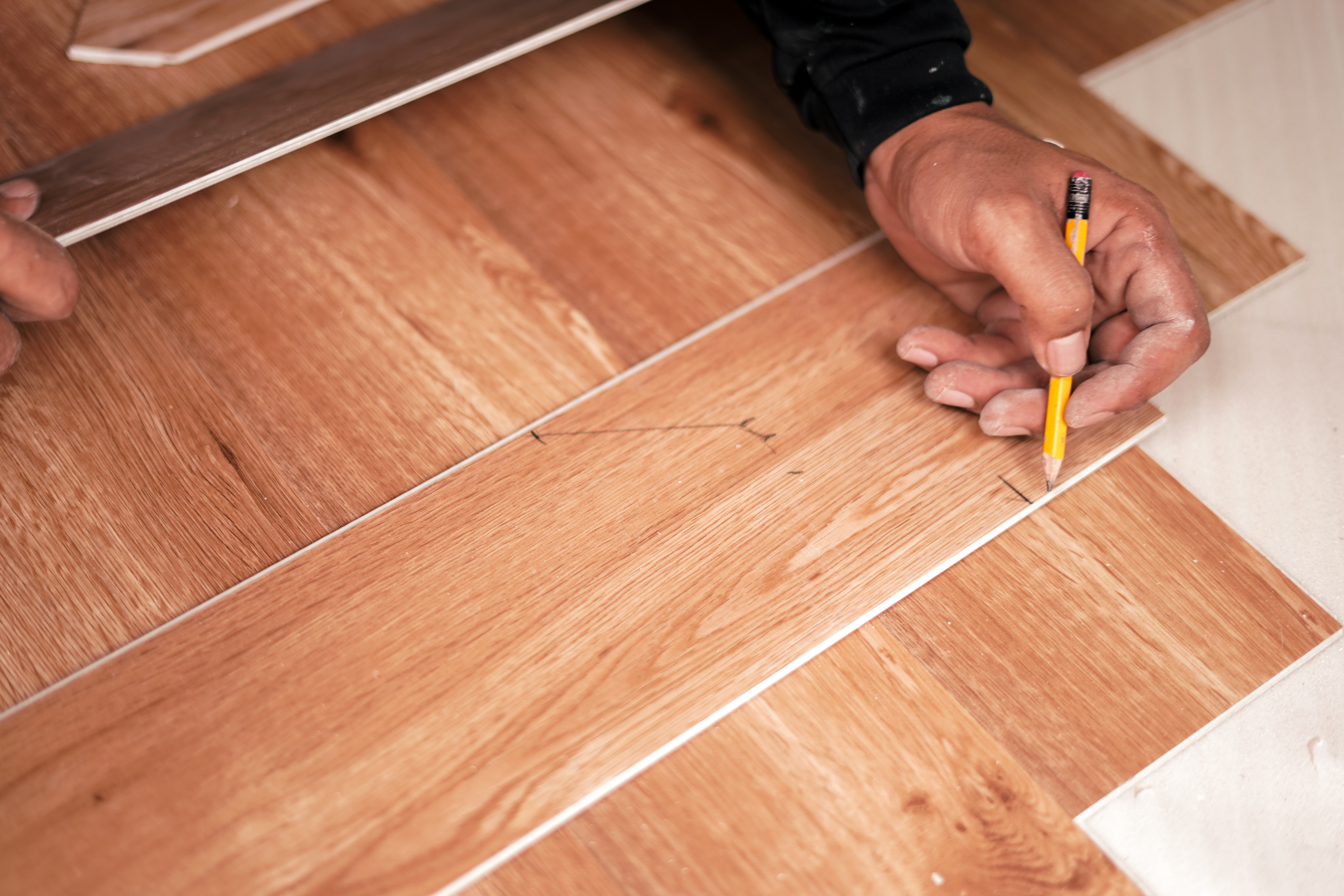
Hardwood floor repair costs depend on the problem. This guide breaks down common costs based on factors like the type of problem, repair method, and whether you hire a pro or DIY.
Hardwood flooring service costs depend on your project and location. Check with a local pro for your specific job.
Renting a floor sander costs $40 to $69 per day or $160 to $268 per week.
Edgers and extension sanders cost $25 to $48 for four hours or $40 to $69 per day.
Sandpaper costs $3 to $12 per sheet and adds significantly to total supply costs.
DIY floor refinishing costs $500 to $1,000, including sander rental and materials.
It’s been nagging at you for a while: your once boldly shimmering hardwood floors are looking dull and worn, crying out to be refinished. You may be itching to flex your DIY muscles, but buying a floor sander is expensive, with the lowest-priced machines starting at $2,500—a steep cost for a piece of equipment you’re likely only to use on rare occasions.
What about a rental? We’ll break down the average costs, so you can make your decision and be on your way back to the elegant and polished hardwood you fell in love with.
Whether you’re renting an orbital sander or a drum sander, the average cost is $55 per day or between $160 and $268 per week.
The cost of floor sander rental varies by the type of machine and the length of the rental. Most big box stores and equipment dealers offer rentals in increments of four hours, or daily, weekly, and monthly rates.

To refinish the majority of your flooring, you’ll be using one large sander. For home use, you’ll have a choice between four different types of machines:
Built with a rotating cylinder outfitted with sandpaper, drum sanders are the most powerful machines available for home use. About the size of a small lawnmower, drum sanders are operated with a push-pull handle. Drum sanders are the most efficient choice—allowing you to finish the job quicker and with less physical effort than an orbital sander, but they pose the greatest risk of damaging your floors if operated incorrectly. Most home rental models are equipped with an 8-inch drum, though some rental outlets also offer 12-inch models. Drum sanders are very heavy—so you will either need to find a rental company that delivers or bring along a friend to help you carry it and load it in and out of the car.
Rather than a rotating drum, an orbital sander has sandpaper attached to a circular or square pad that turns in a circular pattern. Much less powerful than a drum sander, professionals typically use orbital sanders for finishing. But because errors are less likely to result in damage using these lighter-weight machines, DIYers sometimes choose them for the main job. Some homeowners find that refinishing a floor with an orbital sander demands far too much time and effort to be worth hedging the risk to bump up to a higher sanding power with a different machine. An orbital sander will require more sandpaper than a drum sander to do the same job—but it offers benefits like giving you greater access to edges and corners, and one person can transport them.
The only difference between an orbital sander and a random orbital sander is that the sand pad of the latter operates in a pattern using back-and-forth movements as well as circular ones. This gives them a little more power than a standard orbital sander (better suited for DIY refinishing)—and makes them less likely to create a circular pattern on the floor.
As the name suggests, vibrating sanders work your floors with a vibrating pad instead of one moving in an orbital pattern or a rotating drum. Like orbital sanders, they are used primarily for finishing rather than a full sanding job—but they might be your best bet if your flooring has variable patterns, like parquet. Moving smoothly along the floor, they are perhaps the easiest type of sander to use and less likely to create unintentional damage.
All four types of larger floor sanders have rental rates within a similar range. Many rental businesses charge slightly more or less for different machines, so expect costs for an orbital sander rental to fall at the lower end, while drum sanders will be at the highest.
| Rental Period | Cost |
|---|---|
| 4-Hour rental | $30–$48 |
| Per day | $40–$69 |
| Per week | $160–$268 |
| Per month | $415–$828 |
While you can use a drum sander to cover about 90% of your floor, you will need to rent a smaller machine to sand the edges close to baseboards, doorways, and corners—and for tight spots and hard-to-reach places. Edger sanders are handheld and employ orbiting sander pads. However, just because they’re smaller, doesn’t mean they don’t pose risks to your flooring if used improperly. Edging sanders for home use generally feature a 7-inch pad. In addition to edgers, you can also find specialized extension edgers that can reach underneath larger permanent fixtures like heaters and radiators.
The same outlets that will rent you a large sander will also carry a range of this auxiliary equipment, at prices a little lower than they charge for the big sanders.
| Rental Period | Cost |
|---|---|
| 4-hour rental | $25–$48 |
| Per day | $40–$69 |
| Per week | $104–$276 |
| Per month | $276–$828 |

If you’re planning to do the refinishing work, sanding your hardwood floors is just the first part of the job. In addition to the floor sander rental, expect to buy:
| Material | Cost |
|---|---|
| Stain | $27–$40 per gallon |
| Varnish | $165–$360 |
| Belt sander and other sanding materials | $140 |
| Drum sander | $55 per day |
| Tools and painting equipment | $125 |
| Cleaning and safety tools | $150 |
| Sandpaper | $3–$12 |
| Extension cords | $25–$70 |
| Safety goggles | $25 |
| Respirator | $20 |
| Vacuum | $70 |
| Dust bags | $30 |
| Heavy-duty trash bags | $20–$30 |
If you hire a floor repair pro to refinish your floors, expect to pay between $3 and $8 per square foot. While that may seem steep compared to the cost of renting a floor sander, making a mistake with your floors could cost triple that to replace the wood.
Stripping, sanding, and refinishing your floors can be a complex project. Here’s why it’s worth it to hire a local floor repair pro:
Making a mistake, like gouging the floor, can cause permanent damage, requiring total (and costly) replacement of the damaged area.
Expert floor refinishers know how to maintain even speed and pressure with the floor sander for a consistent final result.
They also have the experience necessary to handle delicate floors, parquet floors, unique inlays, and antique flooring, which are often found in older homes.
They own a range of tools suitable for the job, including multiple different types of sanders for wide-open spaces, corners, edges, and detail work.
Professional floor refinishers often offer warranties that guarantee high quality and performance for years to come.
We recommend that you leave floor sanding to the pros, but there are a few things you can do to make the job easier for them.
Clear all furniture and appliances out of the space before your pro arrives.
Give the floor a basic cleaning to remove debris and excess dust.
Make plans for you and your household to steer clear of the area while your pro works. Sanding is a messy job, so consider taking a short vacation day so you can avoid the airborne particles.
Be ready to discuss the square footage of your floor, the type of wood floor, and the desired result.
A floor refinishing expert will be able to measure and calculate the floor dimensions with precision, but you should still know the rough dimensions of the space.
If you still have room in your budget, ask whether the floor pro can also apply the finish.
Home is the most important place on earth, which is why Angi has helped more than 150 million homeowners transform their houses into homes they adore. To help homeowners with their next project, Angi provides readers with the most accurate cost data and upholds strict editorial standards. We extensively research project costs to develop the pricing data you see, so you can make the best decisions for you and your home. We rely on reputable sources, including the U.S. Bureau of Labor Statistics, academic journals, market studies, and interviews with industry experts—all to ensure our prices reflect real-world projects.
Want to help us improve our cost data? Send us a recent project quote to [email protected]. Quotes and personal information will not be shared publicly.
From average costs to expert advice, get all the answers you need to get your job done.

Hardwood floor repair costs depend on the problem. This guide breaks down common costs based on factors like the type of problem, repair method, and whether you hire a pro or DIY.

Both materials and labor determine hardwood floor installation costs. This guide breaks down all the prices you need to know before starting your new flooring project.

It’s impossible to keep floors damage-free over the years. Thankfully, the cost to refinish hardwood floors is far less than the price tag to replace them altogether.

You can transform your floor from cold, hard concrete into warm, soft carpet. This guide teaches you how to install carpet on concrete for a lush DIY transformation.

Can you install hardwood floors over tile? The answer is yes, if you do it the right way. Here’s everything you need to know to upgrade your floors.

Engineered hardwood vs. LVP flooring: Which is best for your home? We break down the pros and cons to help you make the best choice.